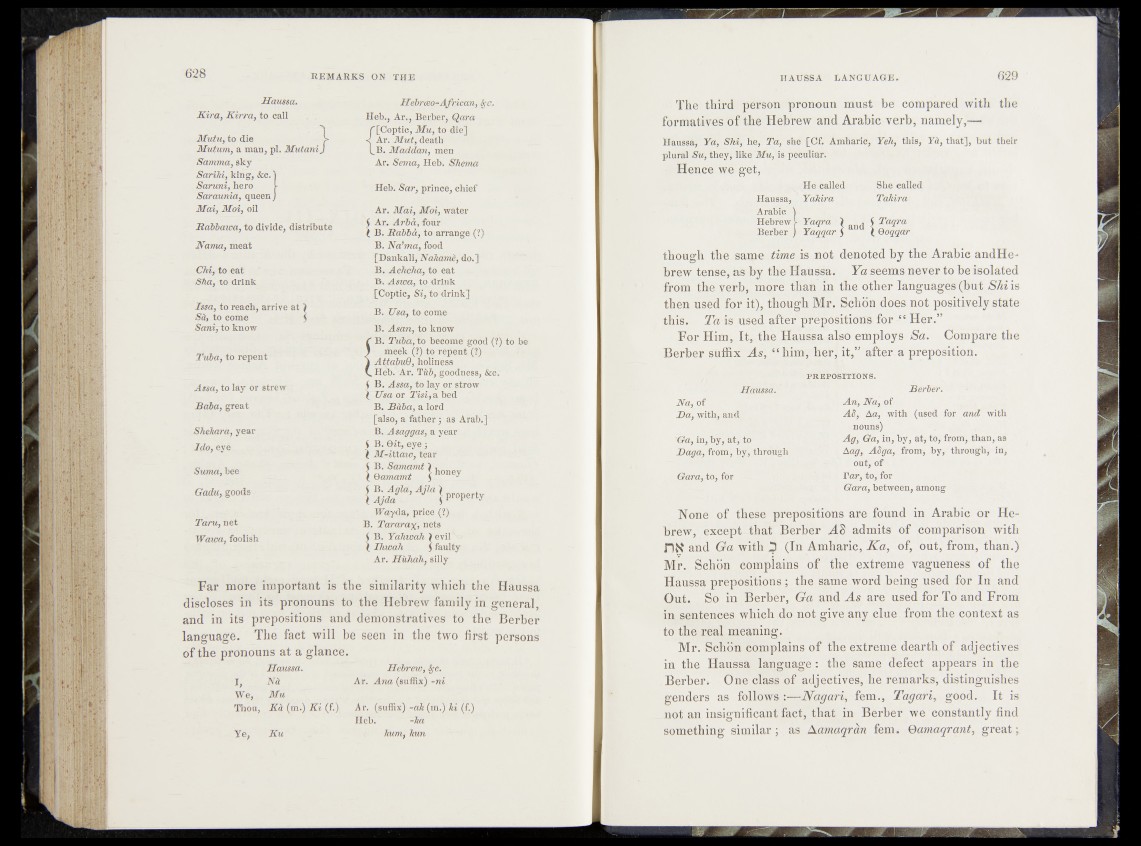
Haussa.
K ira , Kirra, to call
Mutu, to die
Muturn, a man, pi. Mutani
Samma, sky
Sariki, king, &c.
Saruni, hero
Saraunia, queen
Mai, Moi, oil
ItaJfbawa, to divide, distribute
Kama, meat
Chi,~to eat
Sha, Ao drink
Jtssa, to reach, arrive at |
Set, to come J
Sanifto know
Tuba, to repent
Assa, to lay or strew
Baba, great
Shekara, year
Ido, eye
Suma, bee
Gadu, goods
Taru, net
Wawa, foolish
Hebrew-African, fyc.
Heb., Ar., Berber, Qara
[iCoptic, Mu, to die]
Ar. Mut, death
B. Maddan, men .
Ar. Sema, Heb. Shenux
Heb. Sar, prince, chief
Ar. Mai, Moi, water
5 Ar. Arbà, four X B. Rdbbà, to arrange (?)
B. Na,ma, food
[Dankali, Nàkamè,ûo.]
B. Achcha, to eat -
B. Aszva, to^drhtk '
[Coptic, Si, to'drink]
, _ B.Hsa, to come
B. Asan, to know
Ç B. Tuba, to become good (?) to be
) meek (?) to repent (fp,^
1) AttabuO, holiness
C Heb.'Ar. Tào^ -goôdnëis, fee.'
5 B. Assa, to lay or strow '
IfTJsa or Tisi, a bed
B. Bàba, a lord :
"" [also, a fethef ; as Arab.) '
B. A saggas, a yearf,,-
B. ©it, eye ;
M-riitaw,tè&r
B.
B. Samamt ) ,
Qamamt $_honey_ • ^Ä^ property
Warf da, price Ä m
Tararafâ nets
B. Ÿaîiwàh ) evifS»
Ihwah _ J faulty
Ar. Hùhah, silly
Far more important is the similarity whielr the Haussa
discloses in its pronouns to the Hebrew family in general,
and in its prepositions and demonstratives to the Berber
language. The fact will bl? seen in the two first persons
of the pronouns at a glance.
Haussa. Hebrew, fre.
I, Nb Ar. Ana (suffix) -ni
We, Mu
Thou, Kb (m.) K i (f.) A r. (suffix) -ah (m.) hi (f.)
Heb. -£a
Ye,, Ku ' c hum, kun
The third person pronoun must be compared with the
formati-ves of the Hebrew and Arabic verb, namely,—
Haussä, Fa,' Smi ne^Ta, she [C l Amharic, Yeh, this, Yä, that], but their
plural Su, theyj like Mu, is peculiar.
Hence we get,- ■■
, He qalled She called
Haussa, Yahira ' Takira
itt'wArabic
Hebrfew p Yaqra \ ■ , $ Taqra .
Berber J- Yqqqar ) ( Qoqqar
though the same time, is not denoted by the Arabic and Hebrew
tense, as by the Haussa. Ya seems never to be isolated
from the verb, more than in the other languages (but Shi is
then used for it), though Mr. Schön does, not positively state
this. Th is used after preposition's for“ Her” ^
For Him, It, the Haussa also employs Sa. Compare the
Berber suffix As, “ hint, her,, it,” after a preposition.
PREPOSITIONS.
Berber.
~' An, Na, of
Ad, Aa, with (used for and with
nouns)
Ag, Ga, in, by, at, to, from, than, as
Aag, Adga, from, by, through, in,
6u-t, of
rar, to, for
Gara, between, among
Haussa.
Da, with,, and
'Ga, in,by, at, to
Daga, from, by, through
Gara, to, for —
None of these prepositions are found in Arabic or Hebrew,
except that Berber AS admits of comparison with
DX and Ga with D (In Amharic, Ka, of, out, from, than.)
Mr. Schön complains of the extreme vagueness of the
Haussa prepositions; the same word being used for In and
Out. So in Berber, Ga and As are used for To and From
in sentences which do not give any clue from the context as
to the real meaning.
Mr. Schön complains of the extreme dearth of adjectives
in the Haussa language: the same defect appears the
Berbers One class of adjectives, he remarks, distinguishes
genders as follows :—Nagari, fem., Tagari, good. It is
not an insignificant fact, that in Berber we constantly find
something similar ; as Aamaqrän fern. Qamaqrgnt, great;